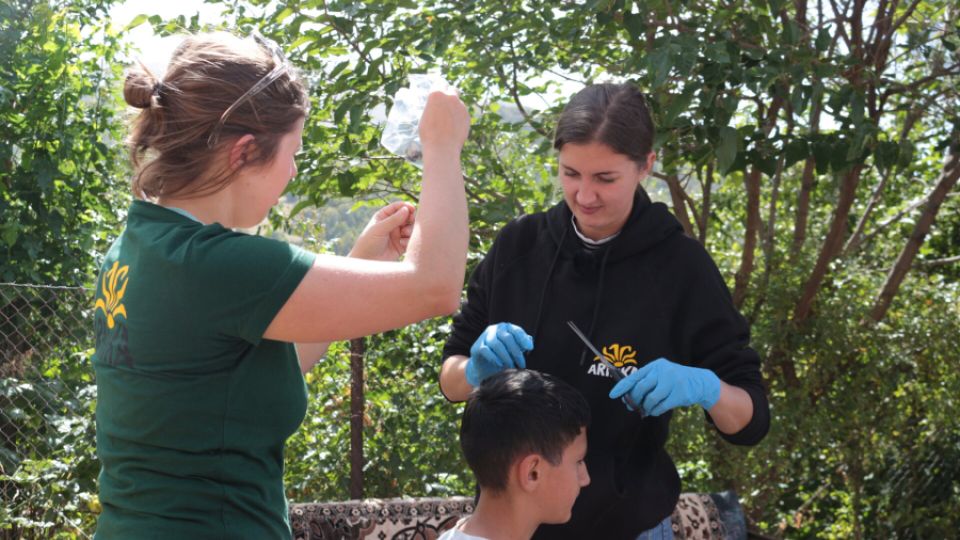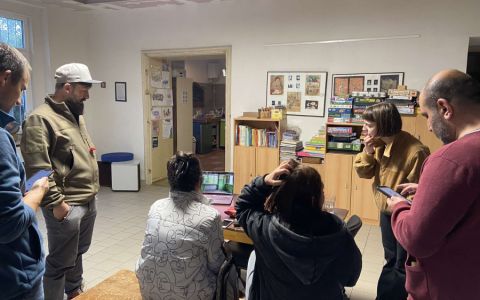In Armenia, we are working to ensure that people in regions affected by mining are informed about the risks involved and have hard data on its impacts on human health and the environment. This year, we have expanded our area of operations to include new sites, Karaberd and Meghradzor, located in Lori and Kotayk provinces. Both these sites are located close to gold deposits.
In September 2022, we visited these communities and collected soil samples, river sediments, and biological samples from local people, specifically urine and hair, for heavy metal determination. In Karaberd and Meghradzor, we are working with local women activists who are indifferent to the fate of their communities. The results of the analyses of the samples we collect will help determine the level of environmental pollution and provide arguments for the local population in disputes over mine expansion, the extension of operations, or financial compensation for damaged health and environment.
! Check out the photo gallery from our field trip to Armenia !
The village of Meghradzor is part of the municipality of Tsakhkadzor, where 5,741 people live. The Meghradzor gold deposit has an exploitation license, where the permitted production volume is 120 thousand tonnes per year. In 2023, Meghradzor Gold LLC, the company operating the site, is due to renew its license. Meanwhile, environmental monitoring carried out in the vicinity of the mine has highlighted the presence of pollutants in the water of the Marmarik River and its surroundings.
The village of Karaberd is part of the unified municipality of Pambak in the Lori region. 146 people live in the community. The Karaberd gold mine is located here, and mining affects the socio-environmental situation and economic activities. Assat Ltd. has been granted a mining license until 2024. It is currently operating on an intermittent basis. Earlier this year, Assat LLC, the mining company at the site, announced its intention to expand the mine. In November 2022, a public hearing on the plan was due to take place with community residents. Still, activists and residents of villages affected by the mining prevented this by blocking the entrance and preventing company representatives from entering the building. In doing so, they expressed their disapproval of the company's mining approach and failure to fulfill its agreed commitments.
Together with another Czech NGO, NESEHNUTÍ, Arnika expressed its disapproving attitude towards the plan to expand the gold deposit in Karaberd. Assat LLC, which owns the Karaberd mine, already has a bad reputation in Armenia. In 2018, the Ministry of Energy and Infrastructure and Natural Resources of Armenia initiated administrative proceedings against Assat LLC for unpaid fees. In 2019, the proceedings were terminated after some debts were paid. According to hetq's source, the company has also committed to paying Karaberd Municipality one hundred thousand Armenian drams every month for the socio-economic development of the municipality. In addition, it was to cover the municipality's extraordinary expenses of up to one million drams per year. Furthermore, Assat LLC undertook to allocate material assistance worth four hundred thousand drams annually for socially vulnerable families in the village. Unfortunately, the company did not honor these commitments and merely used local resources without contributing to the remediation of the consequences of its activities.
The negative experience raises particular concerns about the fulfillment of promises and commitments in the future. At the same time, local initiatives are drawing attention to the critical situation in the region. The village has no kindergarten or school, no health center, and no functioning irrigation system, i.e. the basic amenities and infrastructure necessary for everyday life. Assat LLC also fails to rehabilitate sites used for mining and ore processing. Mining activities harm potential investments to protect biodiversity and promote a sustainable economy. Local initiatives call for fulfilling commitments to the people of Karaberd and corporate social responsibility and respect for the needs of the people whose lives are affected by mining. These requirements should be a prerequisite for access to the EU market.
In part one, we explained why chemical safety is becoming increasingly important in the transition to renewable energy and the growing demand for raw materials.

The Transition Promotion Programme of the Ministry of Foreign Affairs of the Czech Republic supported this project







